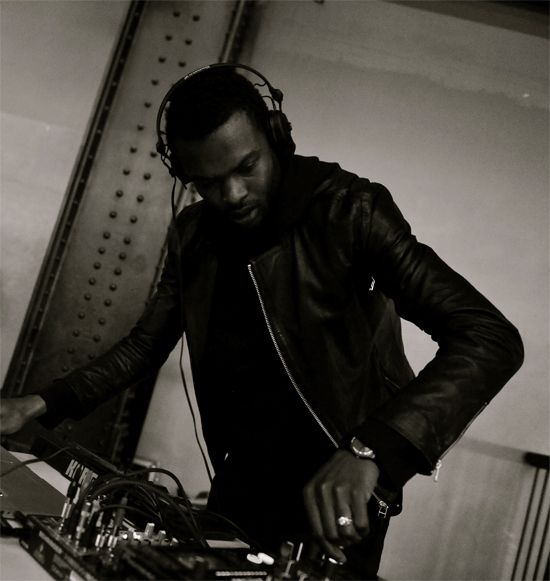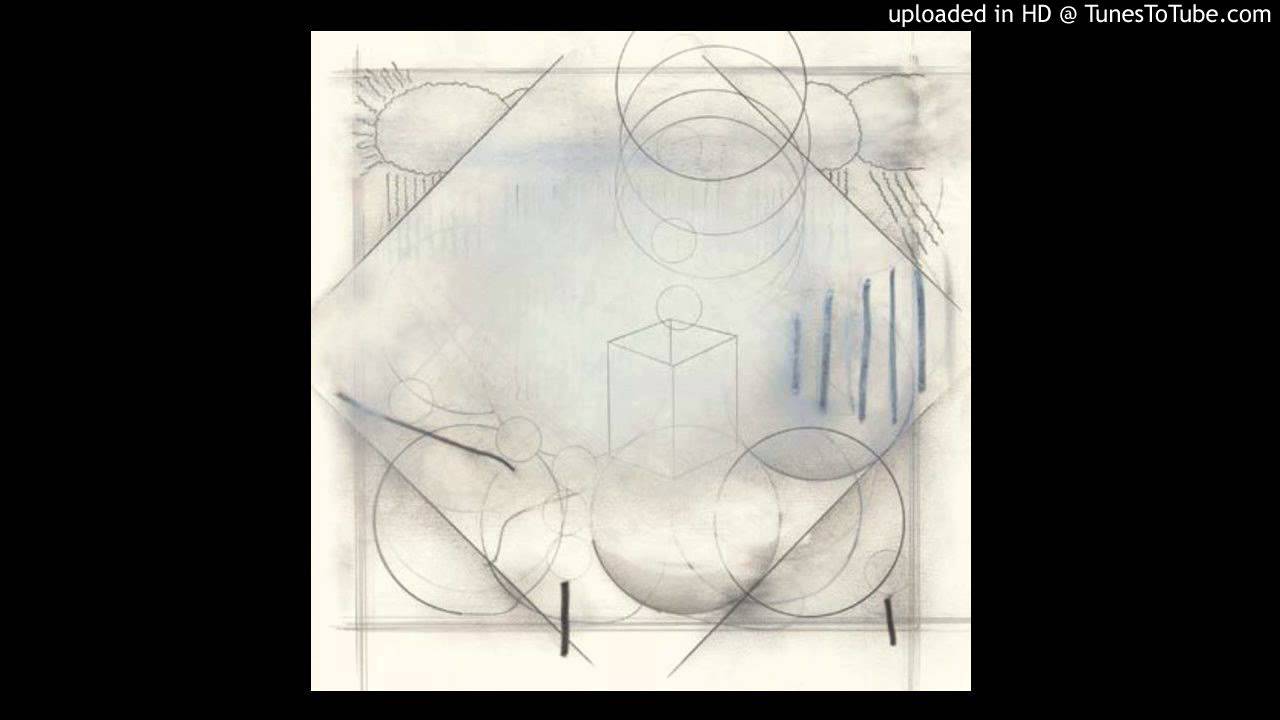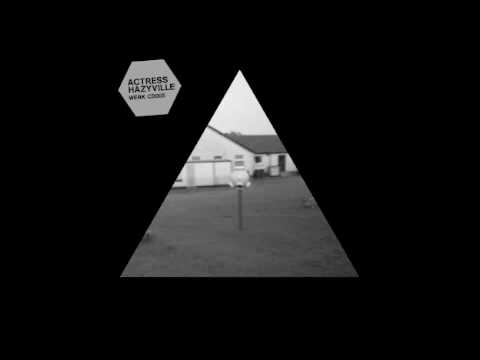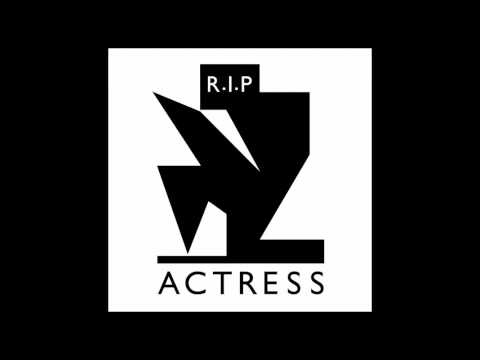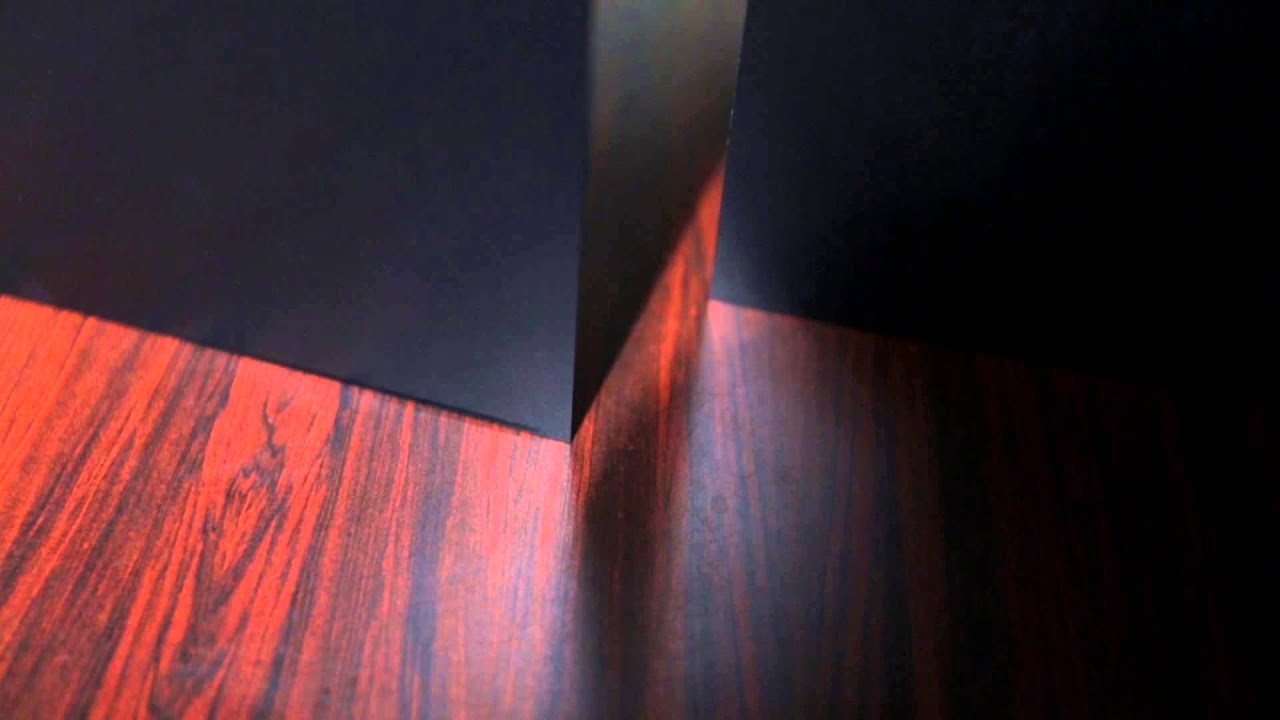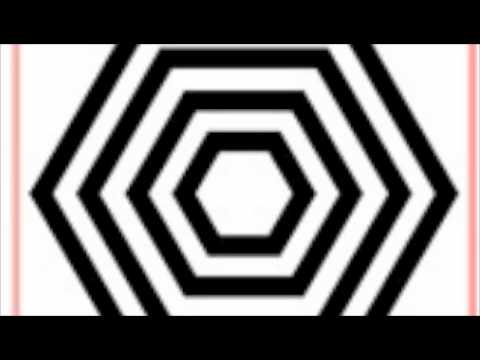Welcome To Ghettoville, Population: Zero. The curtain rises on Actress’ latest album to find Darren Cunningham wandering alone through a barren neighbourhood, past hollowed-out buildings, smashed glass and burned-out cars, everything coated in dust and mud. At first the only real evidence that people have been here are traces they’ve left behind: we’re ushered through opener ‘Forgive’ by the monotone tolling of a church bell, grimly counting time. An exposed electrical cable sparks hotly in ‘Street Corp’, flung about in the wind. It takes until ‘Rims’ for any trace of life to appear: a souped-up, subloaded car rolls by, its occupants booming out syrupy hip hop from behind tinted windows. Everywhere you look textures are decayed, unstable and prone to collapsing inward upon themselves. Even as the album traces a studied narrative arc from total inertia to the fleeting promise of ascension come record’s end, it continues to exert oppressive weight on both mind and body.
Billed as a sequel to Actress’ 2008 debut album Hazyville, the two records play like before-and-after maps of the same local area, sharing a murky and monotone palette. But where before there was plenty of activity visible even through Cunningham’s chronically blunted gaze, Ghettoville looks more like the same landscape in the aftermath of some unnamed disaster. "Dark matter," says Cunningham of its relationship to its predecessor. "A sort of inverted soul, really collapsed, in a way disorienting and confusing. I think it’s that quality – or un-quality – which is fundamentally what I was trying to get out of Ghettoville, and what the essence of the expression was as well."
Since the release of his debut, Cunningham has emerged as one of the preeminent and most singular voices in contemporary British electronic music. A string of albums and 12" releases for labels including his own Werk Discs, Honest Jon’s and Nonplus+ have tracked the development both of a distinct sonic signature and a playful – albeit frequently obtuse – compositional character, drawing strongly from hip hop, Detroit techno, electro and various forms of UK-rooted dance music. In the best of his music those stylistic touchstones are bent right out of shape – digitally crushed, distorted and reshaped – to express a strongly personalised vision, rooted in dance music but often keeping the dancefloor at arm’s length. A track like ‘Let’s Fly’, one of the highlights of 2010’s Splazsh album, embodies some of these contradictory characteristics: on one level its propulsive, spring-loaded momentum is purpose built for club play, but spatially it’s almost unquantifiably wrong, as likely to halt a crowd in its tracks if wielded carelessly. Taken to the furthest extreme, you have the sparsest moments of Ghettoville, 2010’s ‘Paint, Straw & Bubbles’ or 2012’s nightmarish digidub mutant ‘Rainy Dub’, tracks whose drawn-out, barely changing nature feels less like music in the traditional sense than sculpture.
"The mechanism of music isn’t necessarily to unite people all the time," says Cunningham at one point during our interview. He’s discussing his roughshod and unpractised approach to DJing – and its capacity to clear dancefloors, after I mention that’s something I’ve personally witnessed happen – but could as easily be summarising his entire approach. "It’s there to just break the nucleus, just isolate the people who are really getting into what it is that we play. Just let the music do its work."
I’ve met up with Cunningham to discuss Ghettoville and his tenure as Actress to date, immediately after the album’s melodramatic press release has suggested that this phase of his artistic career might be about to come to an end, describing it as "the bleached out and black tinted conclusion of the Actress image". He’s good company, and thoughtful and articulate when discussing both his music and the ideas behind it, almost to the point where some of his answers could be misconstrued as po-faced when written down. Yet that’s twinned with a witty and often outright funny streak. He cites as major inspirations the work of both John Carpenter ("this is somebody who was able to defeat every obstacle which you thought would stop him from making Hollywood films; there’s no way he should have gotten away with doing what he did through Hollywood") and Inspector Gadget theme composer Shuki Levy, admits that "I do find things boring quite quickly", and at one point declares with a shrug that "I can’t rap – half the time, tunes that I make are just me attempting to rap."
Since around the time of 2012’s R.I.P, his last record for Honest Jon’s and whose sweeping narrative took in death, the underworld and reincarnation, via Milton’s Paradise Lost, Cunningham’s vision has broadened to take on multidisciplinary and collaborative aspects. "I never thought I would be, but I’m much more conceptual than I would like to think I am," he says. "Or, should I say, I think everything for me starts with a concept. And I never thought, weirdly, that that’s how my mind worked. But now I think I have to concede that that’s the way it is." He’s written and performed a soundtrack for Tate Modern’s 2012 Yayoi Kusama retrospective, has commissioned video artists to create visual interpretations of tracks from Ghettoville, and last year a one-off show at St. John’s Church in Hackney found him working with artists Eddie Peake and Nic Hamilton for an ambitious performance uniting sound, video and contemporary dance.
You could draw connections between Actress and any number of contemporaries currently tunneling their own distinct furrows through the territories between the dancefloor and the worlds of noise and experimental electronic music. His varied relationship with the club, for example – his own tracks have increasingly sidelined overtly danceable beats, though they often still contain some vestigial traces, and he continues to DJ himself – and the wide-ranging, sui generis quality of Ghettoville, find parallels in recent work by artists like Laurel Halo, Logos, Emptyset and Lee Gamble. He’s also operating in a similar lineage as strongly individual UK predecessors like Richard D James or Autechre and US techno explorers like Hieroglyphic Being, Anthony ‘Shake’ Shakir and Terrence Dixon. Like all those artists Cunningham’s music is defined just as strongly by what it is not, continuously alluding to various musical forms even as it resists allegiance to any one of them, instead embarking on freely evolving voyages through personal space.
Actress – Our from NIC on Vimeo.
"Everything happens in cycles, but I think the nuances change. Slightly or aggressively, I’m not quite sure. Sometimes it’s subtle, sometimes it’s harsh." It’s a drizzly, overcast late January morning, and we’re stood in Darren Cunningham’s South London kitchen. He hands me a cup of tea as his two-year-old mastiff comes bounding excitably through from the next room. The gloopy strains of a DJ Screw tape drift in from the living room stereo. "If I think about all the defining periods that I’ve lived through, age and time has always played a part in how you understand it. So I’ve lived through the Cold War, but I had no perception at the time of how fucked-up it was – you’re just going along on your skateboard, playing your computer games or whatever, and it’s like nothing’s going on. Then you have the Gulf War and you’re older, you understand it a bit more, you start talking about it at school, and fear starts to be introduced into your psyche a bit more on that level. You start to get an idea of how the world can be quite corruptible to you. These things then start to change you as a person – it’s that liminal state of growing up.
"But what’s also interesting is how popular culture plays a massive role in anesthetising that sort of effect," he continues. "So culture in that respect interests me – how popular culture plays its role in the theatre of life. Clubbing, raving, or if you’re dealing with that sort of angst through wearing dark clothes and listening to Nirvana, or going down to the park and kicking a football. So it’s those things, really, that trigger a lot of emotions in the music. And then to the present day, when you’re fully into adulthood, and you have to take very seriously how you’re going to take your path, and how you’re going to walk that path. What is it you’re going to stand for, and what is it you’re going to consider as important; what is it you’re going to talk about, what is it you’re not going to talk about; what is it you’re going to express, what is it you’re not going to express; all these things, especially if you’re talking about art and creativity."
The rocky and challenging terrain of Ghettoville demands context. Its decrepit textures and grinding repetition, strikingly different from the delicate tesselations of predecessor R.I.P, seem to beg for some insight into Cunningham’s mindset at the time of its creation. Then again, it contains easily enough content for listeners to draw conclusions. Its empty street vistas, mood of suffocated resignation and clipped, ambiguous track titles – ‘Forgiven’, ‘Contagious’, ‘Towers’, ‘Don’t’ – strike a particularly potent chord in a contemporary political climate of division and atomisation. What it sounds like is the toxic after-effects of unregulated, euphemistically titled ‘redevelopment’ projects; of buildings left to decay through underfunding and a lack of maintenance; of communities pushed out of local areas by the decline in social housing, rising rents and increased governmental concessions to landowners and property corporations. Ghettoville‘s barren, depopulated cityscape sounds like scorched earth.
Cunningham sidesteps such a directly politicised take on the record, but his reflections on the experiences that informed it touch upon similar territory. About eight years ago, before he’d started making music seriously, he was living with a relative on St. Matthews Estate in Brixton. "At the front there was a patch of grass, and we used to have kickabouts with this kid," he recalls. "He was probably about 14 at the time. I found out that his brother was dealing, ’cause I was interested in getting some weed. So I went round to see his brother one of these days, in a top floor flat, and you’d get a panoramic view of London – you can see central London, the city, from this tower block in Brixton. I stepped in, and it was like time had stopped in this flat. There was this kid I’d have kickabouts with, then his brother who was probably about a year older, and another kid and a single mother, who obviously had issues with drugs and stuff. I could feel once-happy times in there, but then there was this period where it had just ended, because the dad wasn’t there, and there was poverty. You could feel all the badness in there, mixed with all the goodness as well. And it just resonated with me so hard, it was like walking through a portal that completely changes your perspective on everything. I sat down and got my weed, didn’t stick around for too long, and I left."
About two years ago, Cunningham by chance bumped into the same young man on the tube. "This kid I’d kicked about playing football with – who had his eyes illuminated, was playing for a couple of football clubs at youth level, looking to make it but not quite getting there – had just turned into this shell of a person, know what I mean, eyes just gone, dead, basically, just completely cauterised, like a light had gone out. I recognised him straight away and we started chatting, and that hit quite hard."
The pair happened to meet again a year or so later, near Crystal Palace. This time the man was in ragged clothes and borderline homeless, but smiling and engaged. "I tried to weigh up everything – how we met, where he was at when I first met him, where he was at when I met him on the Tube. Our paths kept crossing like that, it just got me thinking. I think that was the starting point of what the core essence of the album was going to be about. Those sorts of things that will never really leave my consciousness." Through these encounters, he continues, "you don’t just see [the other person] – you see yourself. Always trying to look at it from that angle – how they perceive you is as important. And I think my way of dealing with that is to bring myself down to that level musically, in a way. Even if you’re talking about homeless people, it doesn’t mean they have nothing. Someone walking with a trolley which is packed full of garbage, which may not mean anything to a normal person, but would mean everything to that person carrying it – it’s those sorts of juxtapositions and parallels that interest me, in life in general. It’s about seeing what’s around you."
Cunningham’s approach to Ghettoville, by extension, became about "processing my environment, processing the conditions that we live in. But trying not to be prejudiced in any way – so I’m not anti capitalist, I’m not really anti anything, I’m not even anti racism, you know what I mean, because that in itself sorted itself through punk and things like that. It’s almost like you need the badness for it to turn into a goodness. Throughout history it’s always been that – the powers, good, bad or whatever, they always seem to even each other out, the polarities seem to always just keep an even keel.
"I think about those sorts of things a lot, especially from the UK perspective, talking about race and stuff," he continues. "I feel quite privileged and proud in a way that the UK was really the first – post-colonialism and all that shit – to invite Jamaicans to come and live, and come and work. The conditions politically weren’t the same as they are now; you’re talking much more about migrants these days. It wasn’t about that then, because it was an invitational basis, so what my people were dealing with was people in the UK adjusting to change, adjusting to the make up of their country changing. To what you have today, which is an extremely multicultural country where everybody really has taken on each other’s conventions, and language, and understands each other’s food and cultures, and can communicate with each other on the same level – that’s why you’ve got things like grime. In the UK we’re very unique for that, you don’t have that in any other country anywhere. A very, very special situation to be in, whether you’re black, white, Indian or whatever. But if you travel around the world and play different countries, you realise this even more, because it’s not the same."
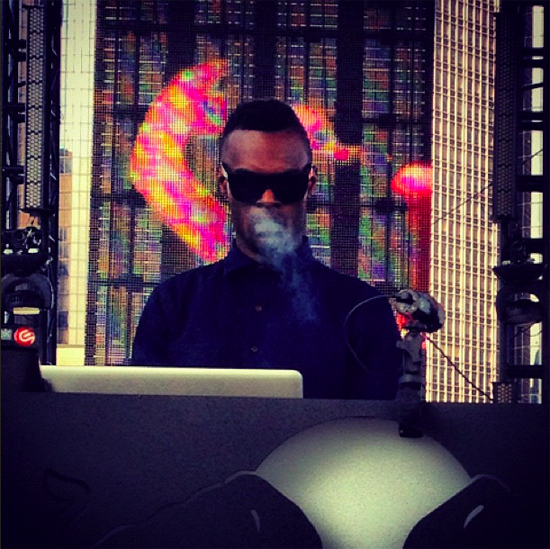
Shell out for the deluxe version of Ghettoville, and inside you’ll also find the first ever vinyl pressing of Actress’ debut album Hazyville, all packaged up in a hefty black box alongside an art book. Upon its release on 2008, that album put Cunningham on the map. Written in a fug of weedsmoke, hence the title, its tracks were thrillingly downcast yet jittery, pranged-out and distinctly British-sounding takes on the Detroit techno influences that were flying around his mind at the time. He’d been making music for a few years before its release, having put his debut EP No Tricks out through Werk in 2004 and played at some of Kode9’s earliest Hyperdub events. Prior to that, growing up in Wolverhampton he’d had a promising career ahead as a professional footballer, playing for West Brom before a serious injury forced him to retire from the game. Hazyville was, he says, "the first time really that I’d sat down with the focus to actually write an album", and it found him starting to hone the blurred samplework and spatially disoriented character that’s since become the bedrock of the Actress sound.
"I was just mad stoned all the time," he recalls. "When you’re like that, you’re just in a cloud, so ideas are literally just fog. And the way I was writing, I was in a one bedroom studio flat essentially, so getting out of my bed and walking to my living room I was basically staring at my set up. The first thing I’d do was wake up – and probably not even have a shower, you know – skin up, sit down, start burning and just start writing. And I could be like that, just pure smoking weed, for like twelve hours. And maybe get a Macdonald’s in between. I was like that – probably not as unhealthy in terms of food – but I was like that for a good two years."
Having spent some time talking at Cunningham’s house, we’ve wandered outside to take the dog for a walk around his local area; the sky is a uniform grey and the rain is light and ever-present, in that particular January-February way. Setting off in the general direction of Crystal Palace, whose TV transmitter mast is visible in the distance, he explains that making his new album a sequel to Hazyville – a record made during what sounds like quite an insular period of his life – was a way to "confront the nature of time, like I was saying about that kid I met at three different quite important periods. I didn’t listen to Hazyville much at all whilst I was making Ghettoville – I wanted the space in between to be the defining factor."
Certainly a lot has shifted since his debut album’s initial release. It arrived at an intriguing juncture, a point in time where multiple pathways were opening and closing in dance music. Dubstep was broadening but beginning to fray around the edges, with its key protagonists heading variously towards pop and big room dance music, house or techno; grime was hitting a dip, having flowered earlier in the decade. Despite being at heart a techno record, Hazyville was a bit too murky and weedy for most straightforward techno crowds, its heavy-lidded, headsy psychedelia having as much in common with the trippy hip hop mutations coming out of LA’s Low End Theory axis and Hyperdub’s wonkified dubstep/funky hybrids, as well as ongoing inspirations like Madlib. Looking back, Hazyville‘s ambiguous nature seems a snapshot of that moment in time, as well as hinting towards developments to come in the years since, with further permeability between club styles becoming an accepted norm.
Cunningham’s music became crisper and more dancefloor defined with 2010’s Splazsh, his first for Honest Jon’s and the first to attract serious attention from the world outside niche electronic music circles. It’s among his most accessible records, too, a set of battered and perversely catchy dance tracks in a style Cunningham at the time half-jokingly dubbed "R&B-concrète". Two years later R.I.P marked another left turn, forsaking the roughshod, sample-mosaic feel of its predecessors in favour of exquisitely scupted structures, hewn from crystalline tones and patterned blushes of fluorescent dye. Where his previous albums were hefty and macro-sized, R.I.P‘s altogether more organic, intricate sound felt more like electron microscopy – zooming deep into the music’s inner workings to reveal a cellular metabolism ticking delicately away.
Following R.I.P‘s release, Cunningham immediately announced that its follow-up Ghettoville would arrive later in 2012. At the time there was talk of his traveling to Jamaica to record it, following a previous trip to the Congo to record with African and British musicians as part of Oxfam and Damon Albarn’s DRC Music project. However, having finished an entire version of the album, Cunningham decided to bin the whole thing and start again. "I felt it was too techno, and one of the things I wanted to do really was destroy that techno structure," he reveals. "So I kind of ripped it apart and pretty much started again. It was near that sort of R.I.P zone, where there’s much more musical discipline going on, and I didn’t want that to be the case with Ghettoville. I wanted it to be a true reflection of what the working title meant, and for me that meant junk, rubbish, aspects of darkness versus light, completely collapsed, decaying, suffocating in a way. Though a lot of those ideas were very close to R.I.P as well."
‘Decay’ is a word that crops up often with reference to Cunningham. It’s emerged as a central preoccupation of the Actress project, both in its frequent references to mortality and the decomposition of physical flesh, and its exploration of decay in the digital domain. R.I.P‘s sound sources are overtly digital, but forsaking the hi-res sheen we’re used to associating with digital music they’re crumbly, pixillated, blurred into impressionistic lo-res; its tracks, which often appear to dissolve as they play, sound assembled from chunks of junk data rescued from a laptop’s Recycle Bin. Resurrecting these sounds into music systems that ripple with life draws attention to their mortality – the easy corruptibility of data we often blindly assume, in an era of endless back-ups and cloud computing, to be essentially permanent. When I first arrive at Cunningham’s house he describes the difficulty of re-acquiring Hazyville‘s artwork for this recent vinyl pressing. Despite the album cover existing in low resolution all over the internet, the original files had been lost in the intervening years – although he admits that fidelity isn’t a great concern of his. In the end, he managed to track down his original old cameraphone with which the artwork photo was taken, and after some difficulty in making it compatible with a much newer computer, eventually managed to rescue the photo.
As we’re walking through a local park, his dog cantering ahead, he expresses his admiration for artists working in pure drone and noise music. "I enjoy it purely for the discipline of what they’re doing, and the purity of what they’re getting across. And whilst I want to sort of do that, I don’t want to be as literal, I guess. I want to have aspects of excavation. For me, sampling is much more a sort of ancient excavation, where I want people to know what the samples are but I want to fucking cover it, or just reveal aspects of it, so you have to actually do a bit more excavation yourself." Making explicit that idea of a sample as being a fossilised entity from another time? "Yeah, exactly," he nods. "Purely that. Totally."
There are artefacts scattered through his music, but they’re not necessarily recognisable as samples; Ghettoville often feels like wandering through an unknown environment with little recognisable to grasp onto, until you occasionally stumble across small human traces that have a powerful emotional pull – a sparking cable, a church bell. They manage, I remark, to encode a huge amount of feeling in music otherwise lacking in overt emotional signifiers. "I used to play the clarinet, and I always really wanted an electric guitar when I was younger, but I never wanted to be in a band. So I do have a musical mind, but I’m not necessarily… I’m much more of a musical thinker than…" He pauses to consider his point. "Okay, it’s basically like this," he declares, abruptly stopping in his tracks. We’re in a narrow alleyway between wooden fences coated in bright green algae. He gestures downwards to the rotting leaves piled up against the fence. "How these leaves have fallen in this formation – they’re brown now, but amongst that you’ve still got a bit of green or whatever – and how it rests against this backdrop, and the concrete – how things have just fallen. That’s how I think about music."
Fittingly for someone whose recent collaborations have brought him closer to the wider art world, Cunningham tends to discuss his working process in visual rather than sonic terms. His studio work is "ongoing, it never really stops". He’ll usually be working on two to three ideas at a time, considering them sometimes for months, before laying down an initial structure on the computer and then leaving it to sit for a while. "But it’s fixated in my mind, I can see the screen, I can see the timeline, I can see everything – how it went together, how I got to that idea in the first place. Then before adrenaline gets the better of me I kind of leave it, and try and keep it in my mind for as long as possible." Like trying to remember a dream? "Yeah. And do things in between, whether that’s sketching or reading a book or whatever, keep feeding the image. Then come back to it and execute a few ideas based on the day and time, and then see how it sounds. That’s how a lot of the tracks come together."
So he sees, more than hears, his ideas for new music? "It’s funny, really, I don’t really hear the idea. Obviously I know what sounds are involved, so I hear the sounds more than anything else. I have no idea what that sound is," he says, referring to the background noise in the kitchen as we speak," but that will influence the idea, in a sense, because I’m always picking up sounds." It’s fascinating listening to Cunningham describing how he thinks about music; at times his sentences – peppered with exclamations of "know what I mean?" – are so idea-dense that it sounds like all the things he’s considering are struggling to come out at once. "I think it happens more automatically than ‘I can just hear it all’ – it’s not like that," he continues, his voice increasing in tempo. "What I hear is what’s occurring all the time, and that’s what music is, essentially – it’s sort of our surroundings, digitised through the human, through either a band or a computer, and probably distilled through sounds which aren’t necessarily correlated to what’s going on at the time, but in effect it’s… it’s really the same thing. It’s just so abstract.
"That’s why I love music," he marvels. "That’s why I love electronic music, or experimental electronic music – you realise the abstract complexities of what it is, or how it started, and then what it becomes, and then how it’s received and how it’s perceived, and then how it’s talked about, and how it’s broken apart, who plays it, who likes it, who hates it, how that affects you, how that doesn’t affect you, it’s all the same thing."
In previous interviews and memorably in the press notes to accompany R.I.P, Cunningham has described his studio process as unconscious, as being "dead when I write". The underlying implication is that he’s become so familiar with his tools that he’s able to use them intuitively, as a means of directly expressing his musical impulses. Given that each of his albums has reflected upon a very particular set of personal preoccupations, it’s a seductive idea, and a romantic one – the notion of an electronic composer so at one with his computer that there’s little barrier between subconscious and sound, in the manner of a master improvisor on a physical instrument. On the one hand, with advances in stability and playability of music technology – whether that’s digital softwares or increasingly advanced modular synthesisers – there’s no real reason why this sort of human-computer interface shouldn’t become increasingly possible. (Indeed, plenty of electronic artists have alighted upon sounds that suggest this sort of symbiosis, whether that’s the improvisation-based techno-jazz-noise of artists like Morphosis and Metasplice, or Bass Clef’s one-take modular showdowns as Some Truths; or looking further back in time, Philadelphian Charles Cohen’s virtuosic ability on the Buchla Music Easel synthesiser).
On the other, of course, there remains an element of mythology to the way Cunningham presents his Actress project, and doubtless these sorts of pronouncements are killer PR. As, indeed, is a record as divisive and conversation-provoking as Ghettoville. In an internet-accelerated world where marketing is everything, he’s got an undeniable knack for positioning his work, whether through dramatic press releases, interesting collaborations and art-world affiliations, a recent Dazed Digital takeover, or the new album’s huge, beautifully packaged statement of a box set. When discussing why Ghettoville is billed as Hazyville‘s sequel, alongside the conceptual connection he’s also frank in his admission that "I need to sell records as well, so there’s also that sort of interest factor to it." But similarly to the many legends that have sprung up around Richard D James, this characteristic of Cunningham’s work is part of what makes it so appealing – the sprinkling of a bit of pop sass onto work that’s typically uncompromising and far from immediate.
"Obviously the Actress project is much more about [exploring my individual interests in sound]," he says, "but without being frivolous, I’m also massively into and always have been massively into pop music and the conventions of pop music. So even though I consider things in that way for the albums I’ve done in the past, it’s always with a mind on how I would imply that, or communicate that, within a pop sort of language. That’s always also on my mind." So the perhaps surprisingly broad popularity of his music – which demands to be considered in its relationship to both other art disciplines and contemporary society at large – feels particularly important at a time when new music discourse is ubiquitous yet often frustratingly shallow.
The narrative that Cunningham has mapped out across the Actress albums to date, he says, is as much an artefact of his own learning process, of "developing a sense of space and a sense of ambience through noise." It’s that learned sensibility that defines his immediately recognisable sonic language – sidechain compression and judicious removal of material are used to turn tracks into dynamic, self-contained ecosystems, where the movement of every element feels inextricably linked with the activities of those around it. The overall feel is peculiarly biological; R.I.P‘s tracks pulse and glimmer like patterns of bioluminescence across the skin of a deep-sea jellyfish, while on Ghettoville the effect is closer to decomposition, with each component gnawing hungrily away at whatever’s around it.
"When I restrict myself to, say, three sounds or less, but in a pure tone sort of way, I’m able to use those sort of tones in a way, and with a complexity, which would be hard for anyone else to do – purely because I’ve been making the music I have done. I’ve kind of attuned my ears to a certain way of dealing with noise, and counterpointing hiss and noise off bass and off padded kicks and whatever. I’ve trained my ears to work spatially, in a way, with minimal sounds. As an example, the ‘Rainy Dub’ record on Honest Jon’s – and ‘Maze’ to a certain extent – is a sort of distilling of all of those ideas in a minimal sense, taking away stuff. I think channeling deeper that way would probably be the next step after," he pauses for a moment, and grins slightly. "After my retirement. You know what I mean."
Ah, yes, that retirement. Ghettoville‘s dramatic press release has been the major talking point about the record in the press; almost to the extent that it’s overshadowed the music itself, this looming question – is Cunningham really about to down tools? There’s something almost self-consciously dramatic about the whole thing – it reads more like a signal that he’s ready to terminate this first musical iteration and move towards something new. In the past he’s described Actress as being one particular role of many; does he feel it’s played its part for the time being? "I feel like that a lot sometimes, yeah," he shrugs.
"But I mean, when you consider the words of the press release, that is a really luvvie moment, it’s sort of flamboyant – "it’s all over, thank you very much, good night, no encore!". It’s one of those. That’s a very momentary thing with me, with the character. There’s truth behind it, because often I do feel like that. But essentially, if it comes to that then I’m at the Jobcentre Plus, looking for a different job. Also, there’s a few organisations who have a vested interest in Actress, so it would be near enough impossible to consider properly retiring."
Plus, it doesn’t seem like he’s going to be running out of ideas any time soon, I suggest. Exactly, he agrees with a laugh, "there’s no time limit on these things anyway, you know what I mean? So, you know, it’s all gravy, really. But the one thing that might probably be truer, in that sense, is that I couldn’t really say when the next thing will arrive, or what form it’s likely to be in. But no, there is really no end or time limit, no."
A Shared Cultural Memory from WerkhausLTD on Vimeo.
‘A Shared Cultural Memory’ performance by Actress, Eddie Peake and Nic Hamilton at St. John’s Church in Hackney, 2013
So where now for Actress, then? With Ghettoville, for the time being at least, acting as endpoint to a neatly symmetrical four-album cycle, can we expect further noise from Cunningham in the near future? He’s clearly in no hurry to actually retire, and indeed in a recent interview he alluded to new music already out there under unknown pseudonyms, though he’s elusive when I enquire about specifics.
One insight into possible future directions for Cunningham might well come from his cross-disciplinary collaborative work with other artists. He describes sensing strong parallels between what he’s trying to express in his music and the work of artists like Nic Hamilton, Eddie Peake, and William Stein, who created the Ghettoville artwork. Last year’s show in Hackney with Peake and Hamilton, for example, involved both visuals and physical performance, making explicit his music’s inbuilt sense of mapping out an environment. "I think it’s important, for the type of music that I make, to at least make some effort to give it some sort of dimensional quality and movement, outside of just trying to sell records and leaving it up to someone else’s imagination," he says of that show.
"Things like that, if you add everything together – what I was trying to do at St. John’s [Church], the videos that have happened and a couple of performance things I’ve done as an individual – I think they all hint towards what is going to occur in the future, in a way. Even though it’s probably not in my mind as to what that might be, I think I’m hinting at it."
It’s a subject Cunningham’s touched upon several times during the course of our two-hour conversation. "What I can express sonically is not necessarily what I can express with words or as a drawing," he says much earlier, while still stood in his kitchen drinking tea. "But I find letters and words actually quite therapeutic just to see, not necessarily trying to decipher it in terms of what it’s meant to portray. Often I feel like that about music and albums; I often think that the most important part of Ghettoville is actually the titles rather than the music sometimes, or the artwork. Sometimes it’s like, well, why consider it just sonically? For me that’s not really the exercise."
Actress’ Ghettoville is out now through Werkdiscs/Ninja Tune

